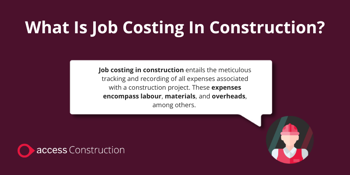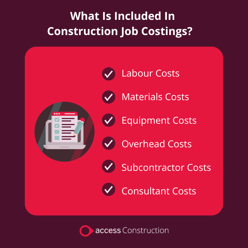What Is Job Costing In Construction?
Job costing in construction entails the meticulous tracking and recording of various expenses associated with a construction project. These expenses encompass labour, materials, and overheads, among others. By implementing job costing, construction companies can effectively assess future profitability and expenses through a comprehensive project analysis and precise cost allocation.

What Are The Different Types Of Costs In Construction?
No construction scheme is the same, and when putting together a job costing, it is useful to categorise costs to ensure an accurate cost to avoid any surprises later in the project.
Below are the three main categories of construction costs:
Direct Costs
Costs that are directly related to the job. This includes labour, tools, and equipment or subcontracts.
Indirect Costs
Costs that are not directly related to the job but are required to support completion. This includes project management fees, the cost of hiring owned equipment and indirect labour such as consultants.
Committed Costs
Costs that have been arranged but are not yet settled. This can include unposted payroll, purchase orders waiting upon bills to pay and any open contract agreements.
Cost construction schemes accurately with Access Construction
Access Coins, our industry-leading ERP built for construction and Access ConQuest, our construction estimating software, helps teams calculate and track construction job costs accurately. Work collaboratively in the cloud with real-time data and build estimates using a price library of over 10 million items.

What Is The Difference Between Job Costing And Process Costing In Construction?
Job costing is primarily used for unique construction projects as an accounting method to track all associated costs.
Process costing is primarily used for mass-produced projects of a similar nature. This is used as an accounting method to track entire costs of multiple projects.
The main difference between job costing and process costing is whether you are accounting for a single project or multiple over a period of time. Job costing would be used for individual projects and process costing would be used for multiple projects of similar nature over a period of time.
How Do You Calculate Job Costing In Construction?
There are many ways job costing can be calculated within construction. While smaller companies use Excel spreadsheets, there is a wide range of construction financial software to make the process easier and faster.
Job costing is a collaborative effort between the back office, estimators and management. This collaboration helps develop an accurate and viable job costing considered from multiple angles.

What Is Included In Construction Job Costings?
Below is what you should include in your job costing calculations to ensure you have covered every cost involved.
Labour Costs
Costs associated with the amount of employees required for the job, the hourly/daily wage rate and the length of time required to complete the job.
Materials Costs
Costs associated with the direct materials involved to complete the job. This may include, wood, steel, electrical wiring, pipes etc.
Equipment Costs
Costs associated with the tools and machinery required to complete a job. This may include, rented or owned equipment (e.g. diggers, hand tools), loading and unloading of materials, maintenance and fuel.
Overhead Costs
Costs that may not be directly associated with the job but are required for the completion of it. This may include equipment depreciation, office rental and administration costs.
Subcontractor Costs
Costs associated with other contractors required to complete a job. This may include plumbers, electricians etc. that are not directly employed by the construction business making the costing.
Consultant Costs
Mainly used for larger projects, these costs are associated with hiring expert consultants to provide recommendations for a part of the job or the scheme as a whole. These consultants are likely not employed directly by the construction company and can be costly.
How Can You Improve Your Construction Job Costings?
Improving job costing will help with providing more efficient and accurate job costs. Below are a few ways project leaders can improve their job costing to help make the costing process more efficient:
Review Projects Frequently
Constantly monitoring your costs throughout the project will help you stay on top of them and adjust accordingly. If unexpected costs arise then this can be factored in promptly and therefore will not be a surprise to yourselves and the client after the job is completed. Daily tracking of labour costs will be particularly useful as these are often the biggest cost involved with a project and can fluctuate.
Double-Check Costings
With all the numbers involved in job costing, tracking elements can prove overwhelming and ever-changing numbers and requirements can be easily overlooked. Ensuring more than one set of eyes reviews the numbers is always good practice to ensure the accuracy of the job costing.
Invest In Construction Management Software
Using cost management software built specifically for the construction industry will help your company generate accurate job costings faster. Jobs can be costed, tracked and updated in real-time, with the ability to forecast budgets during the progression of a construction job. Financial software developed for the industry takes into account all the inputs needed for a job costing, from materials to consultants.
More construction software information, guidance and advice

What Is Cost Value Reconciliation (CVR) In Construction?
Go to article
Creating A Bill Of Quantities On Excel – How Easy Is It?
Go to article
Benefits of Using ERP In The Construction Industry – Reviewing The Pros and Cons Of An ERP System
Go to article

 AU & NZ
AU & NZ
 SG
SG
 MY
MY
 US
US
 IE
IE
